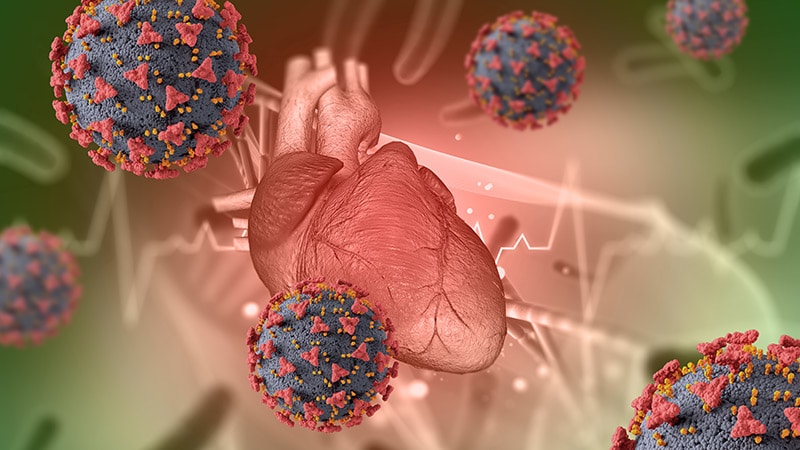Impact of COVID-Positive Donor Hearts on Recipient Survival
แนวคิดหลัก
Heart transplant recipients from donors with active COVID-19 have higher mortality rates compared to those from non-COVID donors.
บทคัดย่อ
The study discusses the impact of using donor hearts with active COVID-19 infection on heart transplant recipients. It highlights the increased risk of mortality associated with heart transplants from donors with active COVID-19 compared to non-COVID donors. The article emphasizes the need for careful evaluation and consideration of risks and benefits when using hearts from COVID-19-infected donors.
Study cautions against using donor hearts with active COVID-19 for heart transplants.
Recipients of active COVID-19 donor hearts had higher mortality rates at 6 months and 1 year.
No clear consensus exists on the evaluation and use of COVID-19 donors for heart transplants.
Importance of continued evaluation and a nuanced approach towards utilizing donor hearts from COVID-19-infected individuals.
Need for further studies with larger patient numbers and longer follow-up to assess outcomes of heart transplants from COVID-19-infected donors.
External perspectives from experts caution about the lack of granular data on viral burden in COVID donors and the need for careful consideration in selecting donor organs.
COVID-Positive Donor Heart Tied to Lower Recipient Survival
สถิติ
"Heart transplantation from an active COVID-19 donor was associated with increased risk for death at 6 months (hazard ratio [HR], 1.74; 95% confidence interval [CI], 1.02 to 2.96; P = .043) and 1 year (HR, 1.98; 95% CI, 1.22 to 3.22; P =.006) compared with heart transplantation from a non-COVID donor."
"Mortality rates at 6 months and 1 year were 13.8% and 23.2%, respectively, for recipients of active COVID-19 donor hearts, versus 7% and 9.2%, respectively, for recipients of non-COVID-19 donor hearts."
คำพูด
"Contrary to two previous reports that found no increased risk of adverse outcomes, the present study noted an increased risk of death associated with the use of hearts from COVID-19-infected patients." - Sean Pinney, MD
"Using a carefully selected organ from a COVID-19 patient may still be in their best interest." - Sean Pinney, MD
"A donor with an active COVID infection is someone that none of us would probably take. But someone with a positive COVID test and a very low virus burden, that is someone that I think most centers would take." - Alex Reyentovich, MD
ข้อมูลเชิงลึกที่สำคัญจาก
by Megan Brooks ที่ www.medscape.com 05-19-2023
https://www.medscape.com/viewarticle/992241
สอบถามเพิ่มเติม
What are the potential long-term effects of using donor hearts from COVID-19-infected individuals on transplant recipients?
The potential long-term effects of using donor hearts from COVID-19-infected individuals on transplant recipients can include increased risk of mortality, as indicated by the study findings. Recipients of hearts from donors with active COVID-19 had a higher risk of dying at 6 months and 1 year post-transplant compared to recipients from donors without COVID-19. This suggests that there may be complications or issues related to the virus that could impact the long-term survival and health outcomes of transplant recipients. These effects could be due to the impact of COVID-19 on the heart and other organs, potentially leading to complications post-transplant that affect the recipient's overall health and well-being.
How can the medical community address the lack of granular data on viral burden in COVID donors to make more informed decisions?
To address the lack of granular data on viral burden in COVID donors and make more informed decisions, the medical community can implement several strategies. Firstly, there should be standardized protocols for assessing and reporting viral burden in potential donors. This could involve specific testing criteria and thresholds for determining the level of viral activity in donors. Additionally, more research and studies should be conducted to understand the implications of different viral burdens on transplant outcomes. By collecting and analyzing more detailed data on viral burden, transplant centers can make more informed decisions about accepting organs from COVID-19-infected donors. Collaboration between transplant centers and researchers can also help in developing guidelines and best practices for evaluating and utilizing organs from COVID-19 donors.
How might the findings of this study impact the prioritization of transplant candidates and organ selection criteria in the future?
The findings of this study could impact the prioritization of transplant candidates and organ selection criteria in the future by prompting a reevaluation of current practices. Transplant centers may need to consider the risks and benefits of using organs from COVID-19-infected donors more carefully. This could lead to changes in organ selection criteria, with a focus on assessing the potential impact of COVID-19 infection on donor organs. Transplant candidates with a higher risk profile or specific health conditions may need to be prioritized differently based on the findings of this study. Additionally, the study highlights the importance of ongoing evaluation and monitoring of transplant outcomes to ensure the best possible care for recipients. Transplant centers may need to adapt their protocols and decision-making processes to account for the implications of COVID-19 on organ transplantation.
0
